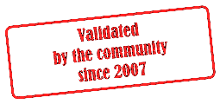ADAPT'14
The 4th International Workshop on Adaptive Self-tuning Computing Systems
January 22nd, 2014, Vienna, Austria
(co-located with HiPEAC 2014)
Best paper award is sponsored by
|
Continuing effort on experimental reproducibility |
Keynote: Towards Resource Management in Parallel Architectures “Under the Hood”
Per Stenström (Chalmers University of Technology, Sweden)A major challenge, moving forwards, is how to off-load software developers from managing resources in future parallel architectures to deliver a high computational efficiency both concerning performance, power consumption and predictability. In this talk, I will present a general framework that aims at managing parallelism, power and predictability “under the hood”. A critical enabling aspect of the approach is to convey semantic, domain-specific information from the programming-model level to the run-time and architecture levels to manage/adapt resource usage at run-time.
Panel on reproducible research methodologies and new publication models
Rising complexity of computer systems, increasing number of ad-hoc tools and techniques, and lack of common and unified mechanisms for knowledge exchange makes it extremely challenging or even impossible to capture, share and reproduce experimental results from our community. This panel brings together industrial and academic researchers to share their thoughts and experience on reproducible experimentation including how to:- capture, catalog, systematize, modify, replay and exchange experiments (possibly whole setups with all artifacts including benchmarks, codelets, datasets, tools, models, etc)
- validate and verify experimental results
- deal with rising amount of experimental data using statistical analysis, data mining, predictive modeling, etc.
- Grigori Fursin * (INRIA, France) [ slides in pdf (~1Mb) ]
- Jack Davidson (University of Virginia / Co-Chair of ACM's Publication Board, USA) [ slides in pdf (~5Mb) ]
- Lieven Eeckhout (Ghent University, Belgium) [ slides in pdf (<1Mb)] ]
- Sascha Hunold, Jesper Larsson Traff (Vienna University of Technology, Austria)
- Anton Lokhmotov (ARM, UK) [ slides in pdf (<1Mb)] ]
- Daniel Mosse, Alex K. Jones, Bruce Childers * (University of Pittsburgh, USA) [ slides in pdf (~13Mb)] ]
Final program
All papers are now available in ACM Digital Library.We accepted 9 papers out of 19.
Each paper had at least 3 reviews.
- T1: Full papers should be at most 6 pages long (excluding bibliography). Papers in this category are expected to have relatively mature content.
- T2: Extended abstract should be between 1-2 pages long (excluding bibliography). Preliminary and exploratory work are welcome in this category, including wild & crazy ideas.
- T3: Extended summary of already published work (must be your own) presenting ideas relevant to the ADAPT workshop. These papers should be between 1-2 pages long (excluding bibliography) summarising the contribution of the original work (including link to it). There will be no proceedings for this type of submissions.
- Reproducible: experimental results are validated by ADAPT volunteers. We would like to thank our external volunteers (Alberto Magni from the University of Edinburgh, UK and Sascha Hunold from Vienna University of Technology, Austria) for helping us to partially validate results of these papers while again emphasizing difficulties to reproduce complex experimental setups in our field due to specific requirements placed on operating systems, libraries, benchmarks, data sets, compilers, architecture simulators, and other tools.
| 10:00-10:10 |
Workshop introduction [ ACM Digital Library ] |
| 10:10-10:30 |
T2: On the advantage of time-varying diversity of workload on functionally asymmetric multi-core
Alexandre Aminot, Alain Chateigner, Yves Lhuillier and Henri-Pierre Charles CEA, LIST, France [ ACM Digital Library ] |
| 10:30-11:00 |
T3: How to Implement Effective Prediction and Forwarding for Fusable Dynamic Multicore Architectures
Behnam Robatmili 1, Dong Li 2, Hadi Esmaeilzadeh 3, Sibi Govindan 4, Aaron Smith 5, Andrew Putnam 5, Doug Burger 5 and Stephen W. Keckler 2,6 1 Qualcomm Research Silicon Valley, USA 2 University of Texas at Austin, USA 3 University of Washington, USA 4 AMD, USA 5 Microsoft Research, USA 6 Architecture Research Group, NVIDIA, USA |
| 11:00-11:30 | Short break |
| 11:30-11:50 |
T2: Roofline-aware DVFS for GPUs (reproducible)
Cedric Nugteren, Gert-Jan van den Braak and Henk Corporaal Eindhoven University of Technology, Netherlands [ ACM Digital Library, shared material at cM ] |
| 11:50-12:10 |
T2: HYDA: A HYbrid Dependence Analysis for the adaptive optimisation of OpenCL kernels
Christos Margiolas and Michael F.P. O' Boyle University of Edinburgh, UK [ ACM Digital Library ] |
| 12:10-12:30 |
T2: A Self-tuning Scientific Framework using Model-Driven Engineering for Heterogeneous Execution Platforms
Alécio Binotto, Leonardo Tizzei and Renato Cerqueira IBM Research, Brazil [ ACM Digital Library ] |
| 12:30-12:50 |
T2: ASAFESSS: A Scheduler-Driven Adaptive Framework for Extreme Scale Software Stacks
Tom St. John 1, Benoit Meister 2, Andres Marquez 3, Joseph Manzano 3, Guang Gao 1 and Xiaoming Li 1 1 University of Delaware, USA 2 Reservoir Labs, USA 3 Pacific Northwest National Laboratory, USA [ ACM Digital Library ] |
| 13:00-14:00 | Lunch |
| 14:00-15:00 |
Keynote: Towards Resource Management in Parallel Architectures “Under the Hood” Per Stenström (Chalmers University of Technology, Sweden) |
| 15:00-15:30 |
T1: Autonomous Fault Detection in Self-Healing Systems: Comparing Hidden Markov Models and Artificial Neural Networks (reproducible)
Chris Schneider, Adam Barker and Simon Dobson University of St Andrews, UK [ ACM Digital Library, shared material ] |
| 15:30-16:00 | Short break |
| 16:00-16:20 |
T2: A LLVM Extension for the Generation of Low Overhead Run-Time Program Specializer
Victor Lomuller and Henri-Pierre Charles CEA, France [ ACM Digital Library ] |
| 16:20-16:50 |
T3: Language support for the construction of high performance code generators
Georg Ofenbeck 1, Tiark Rompf 2, Alen Stojanov 1, Martin Odersky 2 and Markus Püschel 1 1 ETH Zurich, Switzerland 2 EPFL, Switzerland |
| 16:50-17:00 | Workshop conclusions |
| 17:00-18:20 | Common panel on reproducible research methodologies and new publication models |


